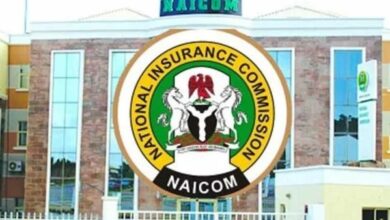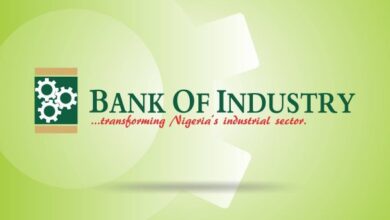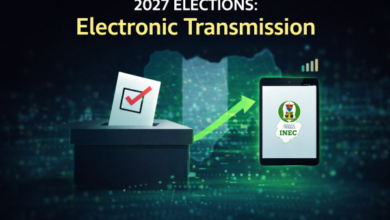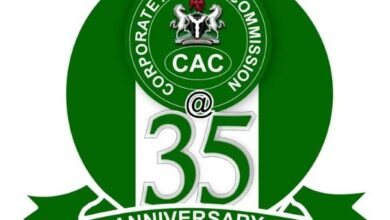Whistle blowing : Buhari committed to strengthening fight against financial crimes, corruption — Minister
 The Federal Government says it remains committed to strengthening fights against financial crimes and corruption in the country.
The Federal Government says it remains committed to strengthening fights against financial crimes and corruption in the country.
The Minister of Finance, Budget and National Planning, Dr Zainab Ahmed, disclosed this commitment at the South West Zonal Conference on the Whistle Blower Policy in Nigeria, held at Adeyemi Bero Auditorium, Alausa Secretariat in Lagos State.
The News Agency of Nigeria (NAN) reports that the two day conference was attended by delegates from each of the southwest states and other stakeholders from various institutions.
The conference was tagged: “Implementation of the Whistle Blower Policy in Nigeria: Issues, Challenges and Way Forward”.
Speaking, Ahmed said the Whistle Blower policy in Nigeria was the result of President Muhammadu Buhari administration’s resolve to vigorously fight corruption in the country.
The minister, who was represented by Alhaji Shehu Shinkafi, Permanent Secretary, Finance (Special Duties) in the ministry, said the fight against corruption was one of the campaign promises made to Nigerians in the buildup to the 2015 general elections.
“On assumption of office in May 2015, the President set in motion the machinery to strengthen the fight against corruption in Nigeria, with the approval granted by the Federal Executive Council (FEC) on March 9, 2016 for the establishment of the Presidential Initiative on Continuous Audit (PICA).
“The policy framework for the establishment of the Whistle Blower policy in Nigeria was also approved by the Federal Executive Council (FEC) in December, 2016.
“The primary goal of the policy is to strengthen the fight against financial crimes and corruption by revealing information on financial crimes and rewarding whistle blowers,” the minister said.
According to her, the South-West zonal conference is historic because of the importance of Lagos, which is the hub of economic activities of the country as majority of private sector investments are domiciled in the state.
She said that one of the responsibilities bestowed on PICA was the development and implementation of the Federal Government Whistle Blower Policy.
Ahmed said the conference was the second on the policy, saying that the first zonal conference on the policy was held in Kano for Northwest Zone from Dec. 13 to 15, 2021.
She added that National Conference on the Whistle Blower Policy in Nigeria was held from Sept. 28 to Sept. 30, 2020 at the NAF Conference Centre, Abuja.
According to her, the national conference led to the charge by the Vice President Yemi Osinbajo to the ministry that the outcome of the conference should be communicated to all the nooks and crannies of Nigeria, which necessitated the zonal conference.
“The policy is being implemented under PICA with representatives of anti-graft and security agencies such as Economic and Financial Crimes Commission, Department of State Services (DSS), the Nigeria Financial Intelligence Unit (NFIU) and the Office of the Attorney – General as part of the implementors of the policy.
“At inception, there was widespread of enthusiasm on the part of Nigerians as they volunteered numerous actionable information.
“Such information or tips were usually referred to the EFCC, ICPC, NFIU or DSS for painstaking investigation. Accordingly, there were recoveries both in cash and non-cash assets.
“The policy also helps in the cleaning up of the integrated Personnel and Payroll Information System (IPPIS).
“Similarly, funds maintained outside the Treasury Single Account (TSA) without authorization by Ministries, Departments and Agencies (MDAs) of the Federal Government were identified and moved back to the treasury,” she added.
The minister, however, said that after some time, interest on the implementation of the policy began to nose dive while most citizens were not aware of the existence of the policy, not to talk about its key objectives.
She added that the workings or operational modalities of the implementation of the policy were generally misunderstood.
“To address these issues, a committee chaired by the Federal Ministry of Justice with representatives from anti-graft and security agencies was set-up to draft a Whistle Blower Bill, taking into cognisance, all the complaints received from the public and the observations of the various stakeholders.
“The draft bill was subjected to a validation exercise with stakeholders, including non state actors like Mac Arthur Foundation, African Centre for Media and Information Literacy (AFRICMIL), professional bodies and others.
“We are here today as part of that sensitisation process,” Ahmed said.
She charged delegates to carry the message to their offices, local government areas and communities.
READ ALSO:https://brandeconomy.com.ng/fccpc-ncaa-set-joint-committee-to-address-high-airfares-flight-delays/
Similarly, Mr Kehinde Oginni of the Economic and Financial Crimes Commission, recommended that there should be adequate provision for effective whistle blowers protection and an enactment of comprehensive law and institutionalisation of whistleblowing practice.
Speaking on the topic: “Role of Deposit Money Banks (DMBs) Toward the Success of the Whistle Blower Policy in Nigeria, Mrs Comfort Eyitayo, ICAN President, said the the success of the whistle blowing initiative could only be achieved with the support of every stakeholder.
Eyitayo said it was imperative that DMBs became more innovative in their whistle blowing processes, ensure confidently of whistle blowers and deepen their collaboration with stakeholders in the economy.
NAN reports that there were series of discussions, questions on fighting corruption in the country.
(NAN)












